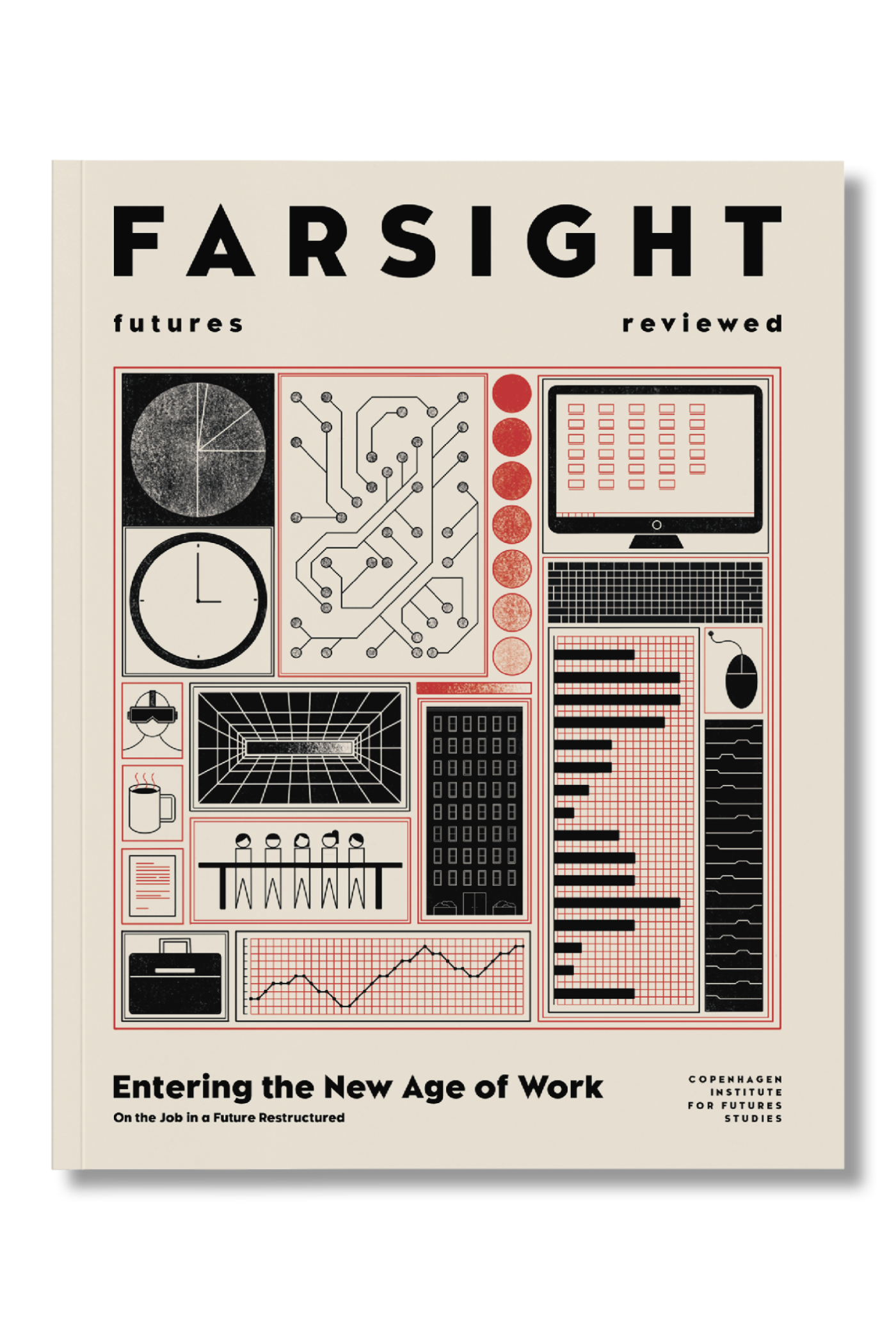
In turn, we use cookies to measure and obtain statistical data about the navigation of the users. You can configure and accept the use of the cookies, and modify your consent options, at any time.

After The Great Resignation
Illustration: Sophia Prieto
One fall out of the Black Death – apart from almost a third of the European population dying – was a radical realignment of the labour market. Before the plague struck, a widespread feudal system saw those who toiled the land bound to landowners. Afterwards, a deficit of labour played to the worker’s advantage as they gained free agency and higher wages. Might Covid-19 have a similar effect?
It was Anthony Klotz, professor of business administration at Texas A&M University, who last year coined the term ‘the great resignation’. What the data suggests is that people are leaving their jobs in record numbers: between August and October in 2021, some 13 million people left their jobs in the US, with some 2.4 million ‘excess retirements’ (more people leaving work than is usual) also being recorded. A similar effect has been noted across Europe.
“What we’re seeing is power realigned with employees,” notes Dr. Grace Lordan, associate professor of behavioural science at the London School of Economics. “They see now that they have the choice to change jobs based on their preferences.”
What remains unclear is why this is happening. The labour market hasn’t yet restabilised after Covid’s introduction of remote working, furlough schemes, and hibernating businesses, and the data required to understand the effects will only emerge years from now. Certainly, the fact that there are currently more jobs available than people to do them is one reason why people may quit, confident that they may find another job.
Yet some claim that the rationale goes much deeper, as the pandemic’s enforced pause, and for some, brushes with mortality, have brought about widespread personal reassessments of the purpose of work and of the nature of their employer. It’s that old idea of work-life balance writ large. Or of tang ping, as it’s called in China – opting out of stressful jobs and accepting that the stellar career one imagined may not happen after all.
Certainly, there is some evidence that the pandemic has proven a watershed moment for how employers manage their employees. Indeed, if finding work used to require that jobseekers impressed their would-be employer, now the reverse is the case. According to studies by MIT Sloan Management, employees are resigning not for lack of desired rates of pay – that’s some way down the list of reasons, in 16th place – but because of the way they feel they have been treated by their employers during the pandemic. A Stanford study suggesting those companies with bad environments typically only doubled down on their lack of support for their employees.
MIT Sloan cites as the top five reasons for quitting, in order of importance: toxic corporate culture – including unethical behaviour and a failure to promote diversity and equity – job insecurity; high levels of innovation (staying at the cutting edge can entail greater stress and longer hours), failure to recognise employee performance, and a poor response to Covid-19. The great resignation starts to look like the great expectation; employees are no longer satisfied with that ageold work-for-money dynamic. These days they want to be looked after too.
Over time this may bring about a more definite change of work culture towards a preference for jobs that may pay less. A study by research firm Just Capital suggests just about everyone would take a lower salary for a better working life that offers something more balanced, more flexible, more aware of employee mental health, and less emphatic of presenteeism. These are attitudes that are readily embraced by start-ups, but which will necessarily have to be embraced over the coming years by more well-established companies as well. Shifting towards a more holistic approach may be harder for the latter, but it’s good for business if it retains the best talent and lowers staff turnover, with the attendant cost to productivity.
Andrew Molinsky, professor of organisational behaviour at Brandeis University, Boston, identifies this shift as being a continuation of a trend that pre-dates Covid-19. “It is an accounting of life and a search for meaning, for something more worthwhile,” he says, citing the FIRE (Financial Independence, Retire Early) movement as being on a similar track. “It’s driven by a desire to resign from what we have to do in favour of what we might want to do, at least for those privileged enough to be able to do so because they have the money or the safety-net. And it’s greatly enabled by social media, gig-worker platforms, and other tech.”
Could it be that after having experienced what Anthony Klotz calls the ‘pandemic epiphanies’ of remote working (and even not working much at all in some instances) people are trying to establish a life in which work is not so dominant at all?
“There are murmurs that people are moving towards a ‘low desire’ lifestyle though there’s no quantitative data on this yet. But if we really do have people who want to live a simpler life, less based on consumerism, then that would clearly have an impact on the labour market”, notes Lordan. “I can’t quite see that happening. Ultimately, human beings find validity in work. But what you can see is that Covid-19 made death more salient, while also giving a sense of getting time back, especially for people in professional jobs. It’s making us ask: what are the essential things we have to do?”
Sure, the pandemic has given us a moment to reassess our priorities. But it’s also suggested that the effects of the great resignation, and especially of some supposed mass move into self-actualising self-employment or start-ups, have been over-stated. The idea that multitudes of people are finally giving up their wellpaid job in, say, corporate finance to open that yoga studio, is far-fetched.
This is, not least, because the freedom to resign is likely biased towards those younger employees with fewer ties, responsibilities, or established career advancement under their belts. Clothing retail and fast food have been prominent among those sectors seeing resignations. Employees in these kinds of jobs have fewer sunk costs, as Molinksy puts it, and their labour is easily transferable to other jobs and sectors. Curiously, also high among quitters are management consultants. They presumably haven’t been successful in advising clients to take a more pro-employee stance.
Of course, while the pandemic may have freed some people to make their great resignation, Covid-19 has been an economic catastrophe for others, employees and employers alike. It would be just as easy to argue that people are more, not less, tied to the security of their established work life. They’re grateful to have their job. Giving it up would seem like a very bad idea.
A 2021 survey conducted by Facebook and Small Business Roundtable suggests that a quarter of small to medium-sized businesses in the US plan to reduce their workforce, with no intentions to rehire within six months. The time of labour having the upper hand may prove short-lived, and the 38% of those recently surveyed by software company Personio who say they plan to quit in the next six months to a year had better take stock first.
What seems more likely, as Lordan puts it, is that the great resignation should be more accurately called “the great reshuffle”. It’s not driven by people acting out of notions of burnout or some anti-work philosophy – valid as those reasons may be. It’s just people moving to other jobs, albeit in unusually high numbers, for myriad reasons. Those who want what might be called lifestyle benefits from their work will continue to gravitate to the employers who offer them; those who accept long hours full-time in an office, compensated with a higher wage, will move to the employers who require that work culture. Employment will be better matched to time of life and its particular circumstances.
“But I think the shift that this brings about is permanent too,” says Molinsky. “It will drive a pressure on companies to compete not just with each other, but with employees who feel they can say “no, I’m out””. Indeed, perhaps the most lasting change to work culture stemming from the Great Resignation is that companies are increasingly going to have to pay attention to the whole person.

For more articles like this, read the issue FARSIGHT: Entering The New Age Of Work